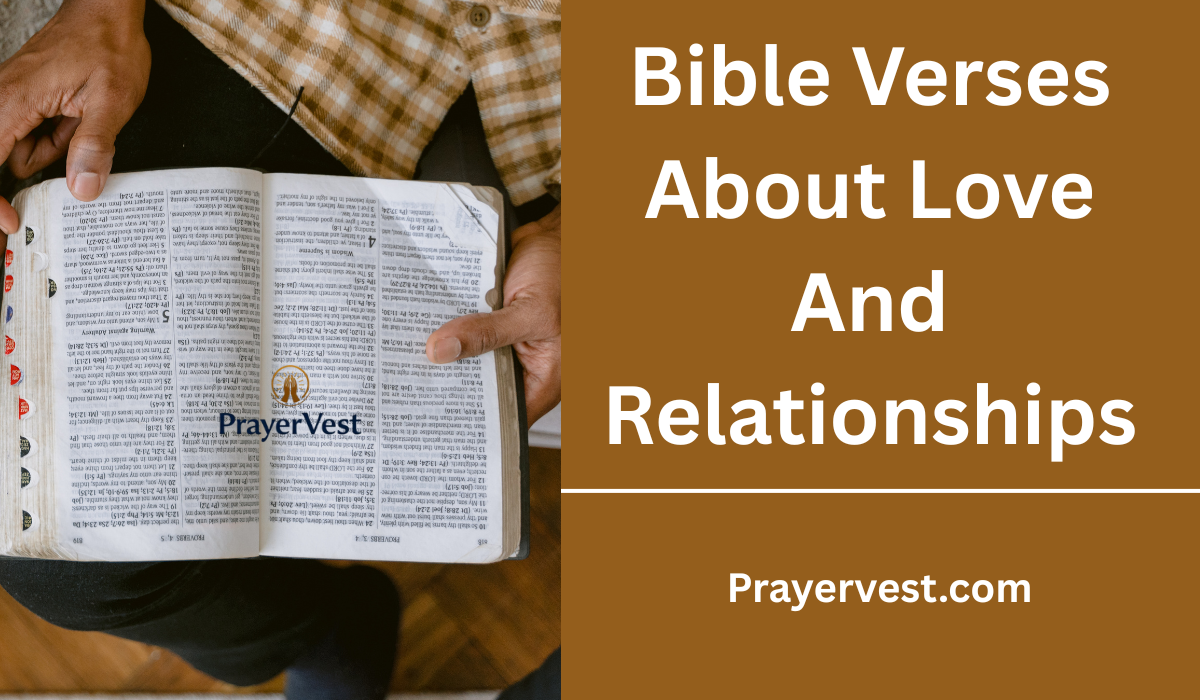The core of the human experience is love and relationships, and the Bible provides ageless guidance on how to handle both with grace, truth, and purpose. Bible Verses About Love And Relationships. Scripture offers direction for relationships that cut beyond time and culture, including friendships, romantic relationships, and familial and communal ties.
The Bible defines love as an activity that is kind, patient, selfless, and enduring, rather than merely a feeling. It is the cornerstone of Christian relationships and the secret to showing others the heart of God.
We experience both happiness and difficulties in relationships. The highs and lows of human relationships—whether in marriage, courtship, friendship, or family—make it clear that we require divine guidance. God, who is love, demonstrates for us how to be faithful when it is difficult, forgive when it is difficult, and serve others even when it is painful.
Scriptures that emphasize respect for one another, dedication, selflessness, and unwavering love serve as a reminder that every relationship is a chance to show God’s nature and create a lifelong bond.


Our understanding of true love—not as the world understands it, but as God reveals it—is aided by these Bible texts regarding relationships and love. They teach us to be modest and gracious, to appreciate and value others, to love in purity, and to ground our relationships on spiritual truth. These Scriptures provide conviction, consolation, and clarity to help you on your path, whether your goal is healing, establishing trust, or just deepening your love.
40 Powerful Bible Verse About Love And Relationships (2026)
1. 1 Corinthians 13:4-5
“Love is patient, love is kind. It does not envy, it does not boast, it is not proud. It does not dishonor others, it is not self-seeking, it is not easily angered, it keeps no record of wrongs.”
This foundational passage defines love not as mere emotion but as a lifestyle marked by humility, patience, and forgiveness. In relationships, these attributes are vital for creating deep bonds and long-lasting connections. True love, as described here, transcends selfishness and fosters selfless devotion, making it the blueprint for godly romantic and interpersonal love.
2. Ephesians 4:2-3
“Be completely humble and gentle; be patient, bearing with one another in love. Make every effort to keep the unity of the Spirit through the bond of peace.”
Paul urges believers to relate with humility and gentleness, qualities that safeguard relationships. Maintaining peace and unity in love requires conscious effort and intentional grace. In both romantic and family settings, these traits help build strong, Christ-centered relationships that reflect the Spirit’s unity.
3. Song of Solomon 8:7
“Many waters cannot quench love; rivers cannot sweep it away.”
The Song of Solomon portrays passionate, committed love as unyielding and enduring. This poetic declaration celebrates the unbreakable power of love that cannot be drowned by life’s trials. In marriages and godly partnerships, this verse reminds us that divine love is resilient and deeply rooted.
4. 1 John 4:7
“Dear friends, let us love one another, for love comes from God. Everyone who loves has been born of God and knows God.”
Here, John teaches that genuine love originates in God, and those who truly love reveal their intimate relationship with Him. Love becomes a litmus test of spiritual authenticity, especially in relationships. When we love others well, we mirror the nature of the God who is love.
5. Colossians 3:14
“And over all these virtues put on love, which binds them all together in perfect unity.”
Paul identifies love as the supreme virtue that unites all others. In relationships, love acts as the glue that holds patience, kindness, and humility together. When love is the foundation, unity thrives, and relationships reflect God’s perfect design.
6. Romans 12:10
“Be devoted to one another in love. Honor one another above yourselves.”
This exhortation promotes mutual devotion and honor, encouraging believers to love with a selfless mindset. Healthy relationships are rooted in prioritizing others and lifting them, echoing Christ’s model of servant-hearted love.
7. Genesis 2:24
“That is why a man leaves his father and mother and is united to his wife, and they become one flesh.”
This verse lays the foundational principle for marriage—a covenant of unity and intimacy. God’s design for relationships is not casual but deeply covenantal, where two become one in a bond of love, respect, and mutual commitment.
8. Ecclesiastes 4:9-10
“Two are better than one, because they have a good return for their labor: If either of them falls down, one can help the other up.”
This wisdom passage highlights the strength and support that come from companionship. In relationships, whether romantic or platonic, mutual support and encouragement are divine blessings that help individuals thrive through life’s challenges.
9. Proverbs 17:17
“A friend loves at all times, and a brother is born for a time of adversity.”
True love in relationships is constant, especially in times of trouble. This proverb affirms the value of steadfast friendship and familial love—those who remain by our side in adversity reflect God’s unwavering presence.
10. Matthew 19:6
“So they are no longer two, but one flesh. Therefore what God has joined together, let no one separate.”
Jesus reaffirms the sanctity of marriage, emphasizing its divine origin and permanence. In godly relationships, this verse underscores the sacredness of marital bonds and warns against anything that would break what God has united.
11. Proverbs 18:22
“He who finds a wife finds what is good and receives favor from the Lord.”
This verse celebrates the blessing of marriage, portraying it as a divine gift and an expression of God’s favor. A loving relationship grounded in God’s principles brings joy, stability, and spiritual enrichment to both individuals involved.
12. 1 Peter 4:8
“Above all, love each other deeply, because love covers over a multitude of sins.”
Peter calls for profound, forgiving love—one that extends grace instead of keeping score. In relationships, such love brings healing, nurtures reconciliation, and reflects God’s mercy by prioritizing restoration over resentment.
13. Philippians 2:2
“Then make my joy complete by being like-minded, having the same love, being one in spirit and of one mind.”
Paul encourages unity and mutual affection within the body of Christ. This principle applies to marriages, friendships, and family ties—real love seeks harmony and shared vision, grounded in Christ-like humility and care.
14. 1 Thessalonians 3:12
“May the Lord make your love increase and overflow for each other and for everyone else, just as ours does for you.”
Paul prays for love that grows beyond limits—love that not only sustains relationships but also enriches the wider community. When love overflows, it creates ripples of kindness, service, and unity wherever we go.
15. Galatians 5:13
“Serve one another humbly in love.”
Love is not passive but active—it manifests through service. In godly relationships, this verse reminds us that love requires humility and sacrifice, consistently putting the needs of others ahead of our desires.
16. Romans 13:10
“Love does no harm to a neighbor. Therefore love is the fulfillment of the law.”
Paul teaches that love is the highest expression of God’s law. Relationships built on love naturally avoid harm, deceit, or selfishness, instead fulfilling the deeper spiritual demand for righteousness and compassion.
17. John 13:34-35
“A new command I give you: Love one another. As I have loved you, so you must love one another. By this everyone will know that you are my disciples.”
Jesus introduces a radical commandment rooted in His sacrificial example. Our love for others, especially in relationships, is the primary evidence of our discipleship and connection to Christ.
18. Proverbs 10:12
“Hatred stirs up conflict, but love covers over all wrongs.”
Love is a powerful force for reconciliation. While hatred breeds division, love softens hearts and brings peace. In relationships, choosing love over retaliation or bitterness paves the way for unity and emotional healing.
19. John 15:12
“My command is this: Love each other as I have loved you.”
Christ’s command invites us to reflect His self-giving love in all our relationships. His love was sacrificial, enduring, and unconditional—the perfect model for how we should love others in any context.
20. Ruth 1:16
“Where you go I will go, and where you stay I will stay. Your people will be my people and your God my God.”
This vow from Ruth to Naomi symbolizes unwavering loyalty and devotion. Though spoken between in-laws, the sentiment echoes what’s required in any deep relationship—steadfastness, shared values, and sacrificial commitment.
21. Mark 10:9
“Therefore what God has joined together, let no one separate.”
Jesus emphasizes the sacred permanence of marriage. Relationships ordained by God are not meant to be broken by human will or conflict. This verse is a call to honor the divine covenant of love and fight for unity even in difficult times.
22. 1 John 4:18
“There is no fear in love. But perfect love drives out fear, because fear has to do with punishment. The one who fears is not made perfect in love.”
True love, especially God’s love, brings peace and safety, not anxiety or dread. In human relationships, love built on trust and godly principles should cast out fear, insecurity, and shame, nurturing confidence and emotional security.
23. Luke 6:31
“Do to others as you would have them do to you.”
The Golden Rule is foundational in all relationships. When we act toward others with kindness and respect, we desire, love becomes reciprocal and genuine, shaping relationships into mutual blessings rather than burdens.
24. Romans 12:9
“Love must be sincere. Hate what is evil; cling to what is good.”
Paul calls for love that is not performative, but real and holy. Relationships should be marked by truth, moral clarity, and genuine affection, not manipulation or pretense. Sincere love uplifts and protects those it touches.
25. Proverbs 3:3-4
“Let love and faithfulness never leave you; bind them around your neck, write them on the tablet of your heart. Then you will win favor and a good name in the sight of God and man.”
This wisdom teaches that love and faithfulness are traits worth holding close. In any relationship, consistency and heartfelt devotion build reputations of honor before both God and people, strengthening personal and communal ties.
26. Hebrews 10:24
“And let us consider how we may spur one another on toward love and good deeds.”
Godly relationships are meant to sharpen and encourage. When love is the driving force, people in close connection inspire each other toward compassion, service, and spiritual growth, enriching not just each other but their communities.
27. Matthew 22:37-39
“‘Love the Lord your God with all your heart and with all your soul and with all your mind.’ … ‘Love your neighbor as yourself.’”
Jesus summarizes the entirety of God’s law in love, for Him and others. Healthy relationships begin with wholehearted devotion to God, which then flows outward into selfless, intentional care for others.
28. Galatians 6:2
“Carry each other’s burdens, and in this way you will fulfill the law of Christ.”
Love in relationships is not only emotional but practical. By helping each other through life’s difficulties, we embody the heart of Christ. Sharing burdens builds trust, empathy, and sacred companionship.
29. 1 Corinthians 16:14
“Do everything in love.”
This concise but powerful command invites love to saturate every action and interaction. In relationships, from the smallest gesture to the biggest decision, love should be the motive, the method, and the message.
30. James 1:19
“Everyone should be quick to listen, slow to speak and slow to become angry.”
Effective communication is essential in relationships, and this verse offers timeless wisdom. Listening attentively, responding thoughtfully, and managing anger cultivate an atmosphere of mutual respect and understanding.
31. Genesis 24:67
“Isaac brought her into the tent of his mother Sarah, and he married Rebekah. So she became his wife, and he loved her; and Isaac was comforted after his mother’s death.”
This tender moment reveals love as both covenantal and healing. Isaac’s love for Rebekah wasn’t just romantic—it brought comfort and renewal. Godly love in relationships has the power to restore hearts and bring peace in seasons of grief and transition.
32. 1 John 3:18
“Dear children, let us not love with words or speech but with actions and in truth.”
Love isn’t just something we say—it’s something we show. In relationships, talk must be backed by tangible action and heartfelt integrity. When love is lived out, it becomes a transformative force rooted in truth.
33. Hosea 2:19–20
“I will betroth you to me forever; I will betroth you in righteousness and justice, in love and compassion.”
God’s promise to restore His people through betrothal speaks of a divine kind of love—eternal, righteous, and compassionate. This model of covenantal love offers a blueprint for romantic and marital relationships that reflect God’s enduring faithfulness.
34. Ecclesiastes 9:9
“Enjoy life with your wife, whom you love, all the days of this meaningless life that God has given you under the sun.”
Even amid life’s uncertainties, Solomon encourages delight in loving companionship. Relationships are meant to be enjoyed, celebrated, and cherished. Love brings meaning and joy into our everyday existence.
35. Zephaniah 3:17
“The Lord your God is with you… He will take great delight in you; in his love he will no longer rebuke you, but will rejoice over you with singing.”
God’s love for us is joyful, tender, and deeply personal. In relationships, we mirror this divine love when we delight in others, extend grace, and cultivate an atmosphere where love brings joy instead of judgment.
36. Malachi 2:14
“The Lord is the witness between you and the wife of your youth. You have been unfaithful to her, though she is your partner, the wife of your marriage covenant.”
This verse underscores the seriousness of faithfulness in marriage. Relationships are not casual—they are covenants, seen and upheld by God. Love honors its commitments and protects the sacredness of partnership.
37. 2 Corinthians 6:14
“Do not be yoked together with unbelievers. For what do righteousness and wickedness have in common?”
Paul cautions against spiritual mismatches in close relationships. Shared faith is foundational for unity in values, vision, and purpose. Godly love thrives when both hearts are aligned under His lordship.
38. Psalm 85:10
“Love and faithfulness meet together; righteousness and peace kiss each other.”
This poetic verse captures the divine harmony between love and faithfulness, righteousness and peace. In godly relationships, these virtues work in tandem to create lasting bonds filled with integrity, peace, and spiritual fruitfulness.
39. Deuteronomy 7:9
“Know therefore that the Lord your God is God; he is the faithful God, keeping his covenant of love to a thousand generations…”
God’s love is faithful across generations, demonstrating consistency and covenant. In relationships, we are called to reflect this enduring loyalty and to build legacies grounded in the unshakable love of God.
40. Psalm 143:8
“Let the morning bring me word of your unfailing love, for I have put my trust in you.”
David’s longing for God’s love at the start of each day reflects the human need for love that is faithful and unfailing. In relationships, beginning with trust in God’s love sets the foundation for every other form of love to flourish.
Conclusion
A clear and stable compass is provided by the Bible in a world where love is frequently misinterpreted or misrepresented. These lines serve as a reminder that true love is based on commitment, sacrifice, forgiveness, and grace rather than just emotion. God’s Word offers the framework for developing relationships that glorify Him and benefit others, whether you’re navigating romantic love, strengthening a marriage, fostering friendships based on trust, or looking for family reconciliation. Scripture defines love as being enduring, patient, and grounded in truth; it reflects God’s heart and strives for the best for others.
May the breadth and strength of God’s love change your relationships as you reflect on these verses. Allow these realities to push and motivate you to communicate more honestly, forgive more readily, and love more selflessly. God is there in every season, whether it is one of joy or adversity, molding, fortifying, and maintaining your relationships with others. Read His Word frequently and allow His love to direct all of your relationships.






